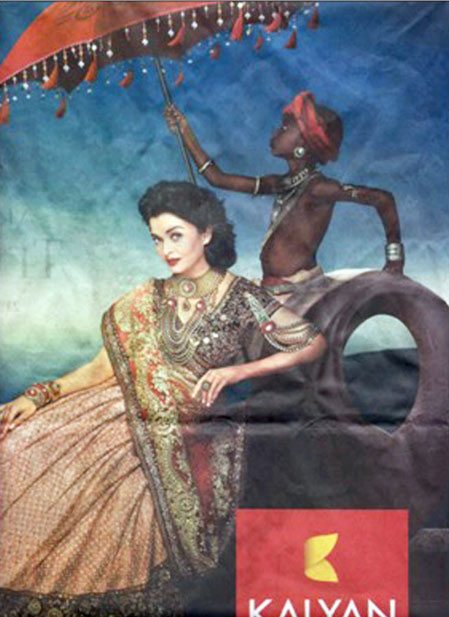Bollywood Megastar Aishwarya Rai Bachchan’s Latest Jewelry Advertisement Sparks Controversy!
Advertisements play a major role in our daily lives by tempting us to buy certain products. Celebrities endorse these products by becoming ambassadors, so they're responsible for shaping the images in our minds. We've witnessed many controversial advertisements, so I'd like to discuss the power of the celebrity when it comes to the advertising industry. Because celebrities are influential figures, they can encourage viewers to follow in their choices. That being said, while some of advertising controversies make sense to me, others seem to reveal anxieties in Indian society that sometimes are stigmatized, tabooed or silenced.
Recently, former Miss World Aishwarya Rai Bachchan ran into controversy when her latest collaboration with Kalyan Jewellers failed to make its mark in the public arena. The controversial advertisement featured her dressed in a regal lehanga (an Indian embroidered skirt and blouse) and wearing lavish jewelry with a 17th century dark-skinned boy holding a parasol over her head. The advertisement was published in The Hindu earlier this month and sparked outrage among children's rights activists and others for reprising images from the colonial era.
A group of activists, according to the BBC, released an open letter to the actress and the company objecting to her association with the advertisement. The letter raised issues about India’s post-colonial history and the country’s obsession with fair skin. It read, “The extremely fair colour of your skin (as projected in the advertisement) contrasted with the black skin of the slave-boy is obviously a deliberate 'creative' juxtaposition by the advertising agency, and insidiously racist." The activists were reminded of the colonial images of 17th and 18th century colonial portraits in which women were depicted being waited on by their "black” servants.
While the Bachchans’ publicist denied the actress’s involvement with the final product, Kalyan Jewellers apologized and withdrew the ad, releasing a statement saying, "The creative was intended to present royalty, timeless beauty and elegance. If we have, inadvertently, hurt the sentiments of any individual or organization, we deeply regret the same.… We have started the process of withdrawing this creative from our campaign."
While the Aish controversy raised issues about skin colour, Aishwarya is not the only one to have been at the centre of an advertisement controversy. In the 1990s, feature models Madhu Sapre and Milind Soman gained notoriety for posing nude with a python for Tuffs Footwear. Not only was an obscenity case filed against the producers and makers of the ad, but animal rights activists also rallied against the controversial ad.
Bollywood power couple Arbaaz Khan and Malaika Arora Khan have also gotten tangled up in ad controversy for their participation and endorsement of the Mr. Coffee brand. Their tagline read, “Real pleasure can’t come in an instant,” which raised a red flag about sexual innuendo — often taboo in India.
In 2013, Bollywood baadshah Shah Rukh Khan also came under fire for supporting Emami’s Fair and Handsome cream, which he shares with younger men, citing white or fair skin for success.
Most recently, actress Deepika Padukone also became a controversial figure with the release of Vogue India’s two-and-half-minute video featuring her and 99 other women calling for the rights of women when it comes to making their own choices no matter what. This message promted backlash from both feminists and men who disaproved of the frivolous way in which the ad addressed infidelity.

These are just a few examples of celebrities using their status to endorse products even when the message isn't quite appropriate or acceptable.
The Milind Soman and Madhu Sapre controversy has its merits and demerits. Of course, using nudity seems like a desperate attempt to sell shoes.
By the same token, both the advertisements involving Milin Soman and Arbaaz Khan allude to sex, sexual imagery and sexual content, which can seem derisive and offensive to many people. However, to me, it seems that these advertisements were made to raise eyebrows and follow the age-old advertising mantra — sex sells. Indian society is uneasy with discussing sex because it's still a taboo subject, and this is uncanny since it has one of the largest growing populations in the world.
In regards to the Aishwarya–Kalyan Jewellers advertisement, I do believe the controversy was justified. While the intention was to show opulence, depicting a dark-skinned child conjured memories of children's rights abuses and slavery associated with the colonial era.
Celebrities are powerful figures in the advertising industry, and their endorsement can make or break some products or brands. Businesses should be very careful in how they position that star power. Even though Kalyan Jewellers failed to hit a home run with with the recent ad and instead created a backlash, it provoked a response nevertheless — allowing us to rethink social issues that remain relevant today, including the issue of dark versus fair skin, which is still unfortunately embedded in the social fabric of Indian society.
Feature Image Source: American Bazaar Online
Nidhi Shrivastava
Author
Nidhi Shrivastava (@shnidhi) is a Ph.D. candidate in the English department at Western University and works as an adjunct professor in at Sacred Heart University. She holds double masters in South Asian Studies and Women's Studies. Her research focuses on Hindi film cinema, censorship, the figure o...















































































































